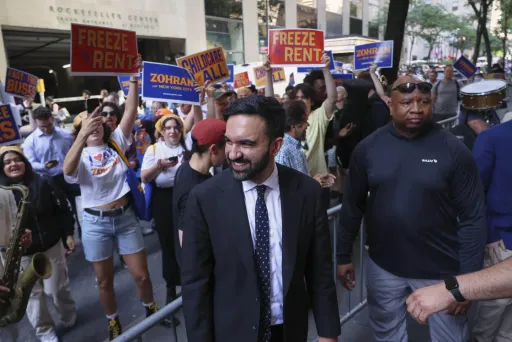As New York's political insiders scanned returns of the Democratic primary in disbelief, Zohran Mamdani was back in the 36th Assembly District on Thursday, which covers parts of Queens, New York City.
By morning, the city's money men were planning a counteroffensive.
According to the New York Times, a group of billionaires, hedge-fund investors, and influential corporate bigwigs met with NYC Mayor Eric Adams in Lower Manhattan, to discuss how to blunt Mamdani's momentum and shore up Adams' re‑election bid.
Billionaire Daniel S. Loeb, aviation investor Rob Wiesenthal, real‑estate broker Michael Lorber, crypto entrepreneur Shayne Coplan, real estate tycoon and developer Meyer Orbach were among those present, the Times reported.
One participant described the mood as "urgent," with attendees weighing advertising blitzes and legal manoeuvres to stop Mamdani.
A few hours later, standing on the steps of City Hall, Adams sketched the argument he plans to take to voters, promising, "blue‑collar" leadership against "silver‑spoon" promises.
"This election is a choice between a candidate with a blue collar and one with a silver spoon," Adams said. "A choice between dirty fingernails and manicured nails."
Billionaires hatching ploy
Earlier, Loeb, a long‑time Adams ally, signalled his alarm on social media, writing, "It's officially hot commie summer."
The unease over Mamdani's policies, including proposals for higher taxes on the wealthy, rent freezes, and city-run grocery stores, has unnerved Wall Street and the wealthy class in NYC.
Scott Rechler, chief executive of RXR, told the Times he would line up behind Adams if the race narrowed to the socialist challenger and the scandal‑scarred incumbent.
"You want to have leadership that speaks to what New York is," Rechler said.
"It's the capital of capitalism."
Hedge‑fund billionaire Bill Ackman wrote on X that he was examining every possible legal path to keep Mamdani from City Hall.
"There are hundreds of million of dollars of capital available to back a competitor to Mamdani that can be put together overnight (believe me, I am in the text strings and the WhatsApp groups) so that a great alternative candidate won't spend any time raising funds," he noted.
Grocery magnate John Catsimatidis, asked on his radio show about the prospect of a mayor who favours rent freezes and city‑run supermarkets, warned he might sell or franchise his Gristedes stores rather than operate under Mamdani.
Some of the most prominent industry titans like Reed Hastings, Barry Diller, Alice Walton, Ken Griffin, William Lauder, and Steven Roth have reportedly expressed similar reservations in recent donor calls, according to people familiar with those conversations.
Collectively, they represent a war chest far larger than any New York candidate can raise through public matching funds.
Mamdani's camp argues the backlash only underscores how sharply the race has turned.
"They're scared of our plan to tax them a little bit more to fund an agenda that lowers costs and raises quality of life for everyone else," campaign spokesperson Andrew Epstein said in an interview.
Born to South Asian parents and raised in New York, Mamdani first organised tenants facing eviction and helped lead rideshare‑driver strikes.
At rallies, he reminds voters that many families now spend a majority of their income just to stay housed and that life expectancy can vary by a subway ride.
He punctuates those statistics with selfies and jokes in fluent English, Urdu, and Swahili, a style that has turned street‑corner speeches into viral clips.
His next hurdle is the general election, where he could face a crowded field: Adams running as an independent and Republican guardian‑angel founder Curtis Sliwa, among others. Cuomo, bruised by Tuesday's loss, has yet to decide whether to mount an independent run of his own.

Tugboat muscling an ocean liner
Negative ads are already in the works, several consultants confirmed.
One strategist who has worked for Adams predicted the barrage will be "harder than anything we saw against AOC," invoking the 2018 race that toppled Congressman Joe Crowley.
The online pushback has turned uglier by the hour.
Civil‑rights monitors say hundreds of Islamophobic posts flooded X within a day of Mamdani's win, some comparing his rise to 9/11 attacks.
Attacks on Mamdani have only increased, but he is used to them.
"I get messages that say the only good Muslim is a dead Muslim. I get threats on my life, on the people that I love," Mamdani said last week, his voice trembling with emotion.
The candidate’s aides insist the vitriol has only hardened his resolve; the campaign claims thousands of door‑knockers and an average donation well under the triple‑digit mark, figures the city's Campaign Finance Board will verify this summer.
Veteran operatives liken the contest to a tugboat muscling an ocean liner.
Mamdani is now gearing to persuade the average New Yorker, shopkeepers nervous about crime, retirees wary of their pensions, and a press corps primed for scandal, all while facing opponents bankrolled by fortunes that could fund a small nation’s budget.
Across the East River, Mamdani's supporters — a mix of young boys and girls, seasoned organisers, first-time volunteers, and borough diehards — are quietly preparing for the long haul.
Notwithstanding the spectacular victory in the primaries this week, the young and working-class in NYC understand the scale of what lies ahead: their candidate, a 33-year-old brown, Muslim democratic socialist, is poised to take on one of the most entrenched power structures in American domestic politics.
Mamdani has a message for them: "Hope, in this city, is righteous. This is the dawn of something new."















